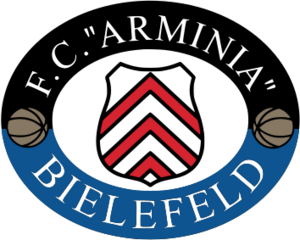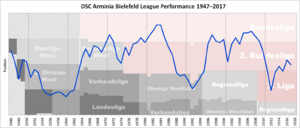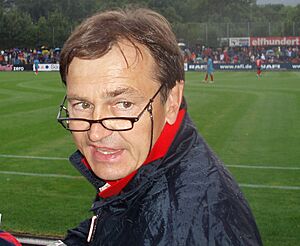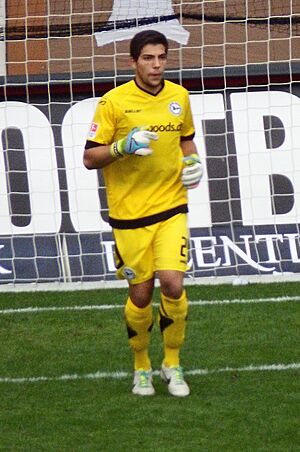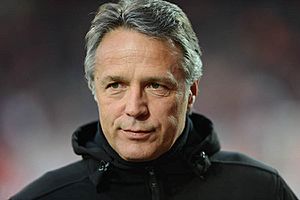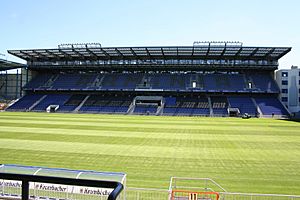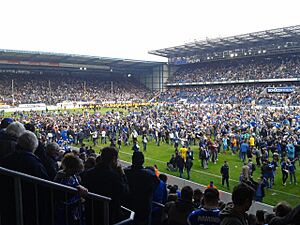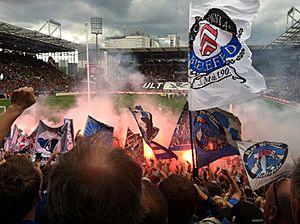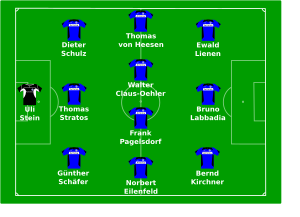Arminia Bielefeld facts for kids
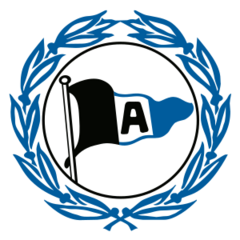 |
|||
| Full name | Deutscher Sport-Club Arminia Bielefeld | ||
|---|---|---|---|
| Nickname(s) | Die Arminen, Die Blauen (The Blues) | ||
| Founded | 3 May 1905 as 1. Bielefelder FC Arminia |
||
| Ground | Bielefelder Alm (SchücoArena), Bielefeld |
||
| Capacity | 27,332 | ||
| President | Rainer Schütte | ||
| Head coach | Michél Kniat | ||
| League | Bundesliga | ||
| 2020–21 | Bundesliga, 15th of 18 | ||
|
|
|||
DSC Arminia Bielefeld, often called Arminia Bielefeld or just Arminia, is a German sports club from the city of Bielefeld. The club is most famous for its professional football team. They have played in Germany's top league, the Bundesliga, for 19 seasons.
Arminia Bielefeld recently won promotion in the 2024–25 3. Liga season. This means they now play in the 2. Bundesliga. The club also has teams for field hockey, figure skating, and cue sports.
Arminia won the West German Championship twice, in 1922 and 1923. They also had successful periods in the 1980s and 2000s. During those times, they played five years in a row in the Bundesliga.
The club is sometimes called a "yo-yo club" (Fahrstuhlmannschaft). This is because they often move between different leagues, getting promoted and then relegated. They have been promoted to the Bundesliga eight times. Their most recent time in the Bundesliga was in the 2021–22 season.
In 2025, Arminia reached the final of the DFB-Pokal for the first time. However, they lost the match 4–2 to Stuttgart.
Arminia's team colours are black, white, and blue. They have played their home games at the Bielefelder Alm Stadium since 1926. The stadium can hold 27,332 fans. Since 2004, the stadium has been called SchücoArena because of a sponsorship deal. Most of Arminia's fans come from the Ostwestfalen-Lippe area. Their biggest rival is SC Preußen Münster.
Contents
- Club History
- How Arminia Bielefeld Started (1905–1918)
- Winning West German Championships (1918–1933)
- Arminia During the Nazi Era (1933–1945)
- After World War II (1945–1962)
- Reaching the Bundesliga (1962–1970)
- Bundesliga Challenges and Return (1970–1980)
- Staying in the Bundesliga (1980–1985)
- Falling to Lower Leagues (1985–1994)
- Comeback and "Yo-Yo" Years (1994–2004)
- Back in the Bundesliga (2004–2009)
- Financial Problems and 3. Liga (2009–2015)
- Getting Stronger (2015–2020)
- Bundesliga Return and Recent Seasons (2020–Present)
- Club Colours and Crest
- Stadium Information
- Arminia Bielefeld Supporters
- Current Players
- Arminia's All-Time Best Team
- Arminia Players in National Teams
- Club Achievements
- Club Management and Staff
- See also
Club History
How Arminia Bielefeld Started (1905–1918)
Arminia Bielefeld was founded on May 3, 1905. It was first called 1. Bielefelder FC Arminia. Fourteen men from the local area started the club. The name Arminia comes from Arminius, a famous German leader. He defeated a Roman army a long time ago.
Two weeks after forming, the club played its first match. In 1906, they joined a league. In 1907, another local club, FC Siegfried, joined Arminia. This made Arminia's team stronger. Soon, other clubs from Bielefeld also started playing in the league.
Arminia moved to a new home ground called Pottenau in 1910. They won their first league championship in the 1912–13 season. They became Westphalian champions by beating BV 04 Dortmund 5–1 in the final. World War I stopped Arminia's progress. From 1914 to 1918, the club played at a lower level.
Winning West German Championships (1918–1933)
In 1919, Arminia joined with Bielefelder Turngemeinde 1848. They formed TG Arminia Bielefeld. But in 1922, the two clubs separated again. Arminia won the West German championship in 1922. They played in the German Championships for the first time. They lost 5–0 to FC Wacker München in the quarter-finals.
In 1923, Arminia won their second West German championship. They were losing 3–1 at halftime in the final against TuRU Düsseldorf. But they came back to win 4–3 after extra time. Arminia then faced Union Oberschöneweide in the German championships. The first match was a draw. In the replay, Arminia led 1–0 but gave up a goal in injury time. The Berlin team won after extra time.
Walter Claus-Oehler became Arminia's first player to play for the German national team. Arminia won more Westphalian titles from 1924 to 1927. But they could not win the West German Championships again. On January 30, 1926, the club took its current name, Deutscher Sportclub Arminia Bielefeld. They won the Westphalian cup in 1932.
Arminia During the Nazi Era (1933–1945)
In 1933, Arminia qualified for the Gauliga Westfalen. This was a top league at the time. They were relegated after their first season. They tried three times to get promoted back. They finally returned to the top league in 1938. Their best finish in the Gauliga was second place in the 1939–40 season.
In 1942, Arminia was one of only two teams to win a match at Schalke 04. On July 25, 1943, Arminia joined with local rivals VfB 03 Bielefeld. The combined team finished last in the 1943–44 season.
After World War II (1945–1962)
After World War II, a new league was formed. Arminia was relegated and could not get promoted back. In 1947–48, Arminia played in the third division for the first time. After a strong season, they were penalized 14 points for using a player who was not allowed to play.
The next season, the Landesliga (second division) added two teams. Arminia took their chance, won the league, and got promoted to the Oberliga West. Arminia's time in the Oberliga lasted only one season. They beat Schalke 04 4–2 at home. But they finished near the bottom and were relegated. In 1954, Arminia was relegated to the third tier again.
Reaching the Bundesliga (1962–1970)
In 1962, Arminia became a second division team again. In 1962–63, they finished seventh. This earned them a spot in the new Regionalliga West. This league was just below the new Bundesliga.
Arminia finished in the middle of the table in their first season. They had top-half finishes in four of the next five seasons. In 1966, Arminia beat Alemannia Aachen to win the West German Cup. The next year, Ernst Kuster joined the team. He became the club's all-time leading goalscorer. This record stood for over 50 years until Fabian Klos broke it.
A 1–0 loss to Wuppertaler SV in 1967 stopped Arminia from reaching the Bundesliga promotion play-offs. Arminia finished second in the 1969–70 season. They won their first promotion to the Bundesliga after beating Tennis Borussia Berlin 2–0 in the play-offs.
Bundesliga Challenges and Return (1970–1980)
In their first Bundesliga season (1970–71), Arminia was in a relegation spot halfway through. But they finished 14th. However, it was found that Arminia and other clubs were involved in match-fixing. Two Arminia players were banned from football for life.
Arminia played in the 1971–72 Bundesliga season while the investigation continued. They finished last. The German Football Association found them guilty of match-fixing. They lost their license and were forced to be relegated at the end of the season. Arminia finished in the middle of the table in the next seasons. They qualified for the new 2. Bundesliga in 1974.
After returning to the 2. Bundesliga in 1974, Arminia had a great first half of the 1976–77 2. Bundesliga season. They finished second behind St. Pauli. They then played 1860 Munich in a play-off for promotion. Arminia won the first match 4–0 at home. But they lost the second leg in Munich, also 4–0. A third match was played in Frankfurt, which Munich won 2–0.
The team recovered and won promotion to the Bundesliga for the 1978–79 season. Under coach Otto Rehhagel, they won 4–0 at Bayern Munich in March 1979. But they finished 16th and were relegated. The club kept the team together. They were immediately promoted back to the Bundesliga after a record-breaking 1979–80 season. They won 30 of 38 matches and scored 120 goals. They had a 28-match unbeaten streak. They also set a league record by beating Arminia Hannover 11–0.
Staying in the Bundesliga (1980–1985)
Arminia found it hard to avoid relegation, but they stayed in the Bundesliga for five years. During this time, they finished eighth twice, in the 1982–83 and 1983–84 seasons. These are still Arminia's best finishes in the Bundesliga. Arminia also played in the UEFA Intertoto Cup three times.
In August 1981, Arminia Bielefeld player Ewald Lienen was badly injured in a tackle. This was called "the most brutal foul in Bundesliga history" by the press. Attendances dropped in the mid-1980s, causing money problems for the club. In 1984–85, Arminia finished third from bottom. They lost a relegation play-off against 1. FC Saarbrücken.
Falling to Lower Leagues (1985–1994)
By late 1987, Arminia had a lot of debt. In 1987–88, they finished last in the 2. Bundesliga. They were relegated to the Oberliga Westfalen. Ernst Middendorp became the new coach. He put together a young team. Arminia finished second in the Oberliga in 1988–89. They won the Oberliga a year later. But they failed to get promoted after play-offs.
For four seasons, they did not qualify for the 2. Bundesliga promotion play-offs. In 1991, Arminia won the Westphalian Cup. This cup allowed them to play in the DFB-Pokal. They beat FSV Mainz 05 in the first round of the 1991–92 DFB-Pokal.
Comeback and "Yo-Yo" Years (1994–2004)
In 1994, Arminia signed experienced Bundesliga players like Thomas von Heesen and Fritz Walter. Arminia struggled at first. But they went on to win the new Regionalliga West/Südwest championship. This ended seven seasons in local league football. They then finished second in the 1995–96 2. Bundesliga.
Arminia signed Stefan Kuntz for the 1996–97 Bundesliga season. This was their first time in the Bundesliga in 11 years. They finished 14th. In 1997, the club signed the first two Iranian Bundesliga players, Ali Daei and Karim Bagheri. However, after a bad run, Arminia was relegated.
Bruno Labbadia became the league's top scorer with 28 goals in the 1998–99 season. The club immediately got promoted back to the Bundesliga by winning the 2. Bundesliga. The club started the 1999–2000 season with less money. They were relegated after losing ten matches in a row.
Arminia struggled against relegation again the next season. But they avoided dropping to the Regionalliga. The next year, Arminia won their sixth promotion to the Bundesliga in 2001–02. They finished second, with Artur Wichniarek scoring 18 goals. Arminia could not avoid relegation the next season. They earned only two points from their last six matches. Arminia's habit of moving between leagues often led to them being called a Fahrstuhlmannschaft, or yo-yo club.
Back in the Bundesliga (2004–2009)
The team earned promotion to the Bundesliga again in 2003–04. Ghanaian striker Isaac Boakye scored 14 goals in his first season. They stayed in the top league until 2009. In 2004–05, Patrick Owomoyela became Arminia's most capped German player. He played six international matches for Germany while at Bielefeld, a club record.
Arminia reached the semi-finals of the DFB-Pokal in both 2005 and 2006. They lost to Bayern Munich and Eintracht Frankfurt respectively. Arminia finished 13th in the Bundesliga in both 2004–05 and 2005–06.
Under Ernst Middendorp, Arminia avoided relegation in the 2006–07 season. They won four matches in a row near the end of the season. The rebuilding of the East Stand in 2007 got a lot of attention. The club even had a webcam to show the work.
The 2007–08 season started with three wins in the first five matches. But three matches later, Arminia had their second-biggest Bundesliga defeat. They lost 8–1 away to Werder Bremen. Relegation was avoided on the last day of the season. The following season, Arminia finished last and was relegated to the 2. Bundesliga.
Financial Problems and 3. Liga (2009–2015)
Some key players stayed for the 2009–10 2. Bundesliga season. On March 16, 2010, Arminia lost four points. This was because they broke league rules. They finished the season in seventh place. The club's money problems got worse. The costs for building the East Stand were much higher than planned. The coach, managing director, and president were all replaced that summer.
The 2010–11 season started with Arminia in last place after 11 matches. In November, their manager Christian Ziege was replaced by Ewald Lienen. Lienen was a former Bielefeld player. However, Arminia only won four games all season. They finished last and were relegated to the 3. Liga.
For the 2011–12 season, a new team was formed. Players like Fabian Klos and Stefan Ortega Moreno joined. After a difficult start, they finished 13th. But they won the Westphalia Cup. This allowed Arminia to play in the 2012–13 DFB-Pokal. They beat the 2. Bundesliga team SC Paderborn 07. But they lost in the second round against Bayer Leverkusen. On May 11, 2013, Bielefeld beat VfL Osnabrück 1–0. This guaranteed them a top-two finish and promotion back to the 2. Bundesliga for the 2013–14 season.
In 2013–14, Arminia qualified for the second round of the 2013–14 DFB-Pokal again. But their league form got worse. Their coach Stefan Krämer left. Under his replacement, Norbert Meier, Arminia finished 16th. They lost a relegation play-off against SV Darmstadt 98.
In the 2014–15 DFB-Pokal, as a 3. Liga club, Arminia defeated three Bundesliga teams. They beat Hertha Berlin, Werder Bremen, and Borussia Mönchengladbach. They reached the semi-finals, where they lost to Wolfsburg. They also got promoted back to the 2. Bundesliga. They secured the title in their last match.
Getting Stronger (2015–2020)
In 2015–16, Arminia lost in the first round of the 2015–16 DFB-Pokal. They had 18 draws in the league. Their 4–2 win over Greuther Fürth helped them stay in the league. They finished 12th. After the season, coach Norbert Meier left.
Two managers were replaced in the 2016–17 season. But Arminia avoided relegation. They finished 15th after a 6–0 win over Eintracht Braunschweig. They reached the quarter-finals of the 2016–17 DFB-Pokal, losing to Eintracht Frankfurt.
The 2017–18 season was easier. Arminia finished fourth. The club also reduced its debts. Fabian Klos became the club's all-time top scorer. In November 2018, the club sold its stadium. In the 2018–19 season, Arminia finished seventh. Their coach Jeff Saibene was replaced by Uwe Neuhaus. They lost 3–0 at home against MSV Duisburg in the 2018–19 DFB-Pokal.
The 2019–20 season was much better. The club won the 2. Bundesliga. This was their eighth promotion to the Bundesliga, a record they share with 1. FC Nürnberg. They moved to third in the table after an early 2–0 win against Hannover 96. They were in a promotion spot when they played Schalke in the 2019–20 DFB-Pokal in October 2019. Arminia scored twice late in the game but lost 3–2. They moved to the top of the league in December. The season was paused in March 2020 due to the COVID-19 pandemic. But they finished as champions with 68 points. They lost only two league matches all season.
Bundesliga Return and Recent Seasons (2020–Present)
In the 2020–21 season, Arminia had the lowest budget in the Bundesliga. In March 2021, their manager Uwe Neuhaus was replaced by Frank Kramer. A 2–0 win over VfB Stuttgart on the last match day kept them in the 2021–22 Bundesliga. But they finished that season in 17th place and were relegated to the 2. Bundesliga.
In the 2022–23 season, Arminia finished 16th. They lost the relegation play-off to Wehen Wiesbaden. This meant they were relegated for a second season in a row. In their fourth season in the 3. Liga in 2023–24, captain Fabian Klos announced he would retire. He ended his 13-year career with the club.
In 2025, the team reached the final of the DFB-Pokal for the first time. They beat the previous winners Bayer Leverkusen 2–1. They were the first third-division club to reach the final since 2001. They were also the first such team to knock out four higher-ranked Bundesliga teams in one season. Their American captain Mael Corboz gained international attention. In May 2025, Arminia won the 3. Liga title. They beat Waldhof Mannheim 1–0 in their final game. The following week, they lost the DFB-Pokal final 4–2 to Stuttgart.
Club Colours and Crest
Arminia chose black, white, and blue as their club colours when they started in 1905. But they played their first match in an orange uniform. Arminia's home uniform was mostly blue, with white shorts and socks. The team that played in the Bundesliga in the 1970s wore a blue shirt with thick white stripes. The away uniform was usually all white. Green shirts were worn in the 1990s. The club's current colours are black, white, and blue.
The club's crest (logo) shows a flag with the club's colours: black, white, and blue. The white part of the flag has the letter A for Arminia. A laurel wreath surrounds the flag.
Stadium Information
Arminia played their first home matches at the Kesselbrink in downtown Bielefeld. They moved to a new ground in 1907. In 1910, they moved to the Pottenau. In 1926, Arminia rented land from a farmer named Lohmann. The area did not look like a football pitch. A club member said it looked like an Alm (German for alpine grassland). So, the stadium became known as the Alm. Arminia played its first match there on May 1, 1926.
The first grandstands were built in 1954. When Arminia was promoted to the Bundesliga in 1970, the Alm was improved. A main stand with seats was built. The northern and eastern stands were made bigger. The Alm could hold 30,000 people. Floodlights were also installed. In 1978, a roof was added to the main stands. The other stands were made bigger again. The stadium then had a capacity of 35,000.
When Arminia was relegated in 1988, the northern and southern stands were taken down. This was because they did not meet new safety rules. The eastern stand was also made smaller, and a roof was added. The capacity was reduced to about 15,000. After Arminia was promoted to the Bundesliga in 1996, the main and northern stands were completely rebuilt. The same happened to the south stand in 1999. In 2004, Arminia signed a sponsorship deal with Schüco. The stadium was then named SchücoArena. The most recent renovation was the rebuilding of the Eastern Stand in 2008.
The stadium can hold 27,332 fans. This includes 7,940 standing places and 19,392 seats. Bielefelder Alm was considered to host matches for the 2011 FIFA Women's World Cup.
Arminia Bielefeld Supporters
Arminia has many loyal supporters. Even in the 2011–12 season, Arminia had an average attendance of 8,930. This was the highest in the 3. Liga at that time. In 2014–15, Arminia had an average attendance of 14,540. This was the second highest in the 3. Liga that season. The core group of fans can be found in the standing areas of the Southern Stand.
Arminia's fans mainly come from the Ostwestfalen-Lippe region. This area is about 100 kilometers around Bielefeld. There are around 140 fan clubs. Most are from Ostwestfalen-Lippe. But there are also fan clubs in Berlin, Stuttgart, London, Birmingham, Taunton, Austria, and the Netherlands.
The team's games are regularly broadcast by local radio station Radio Bielefeld.
Team Rivalries
Arminia has a long-standing rivalry with SC Preußen Münster. A match against them in March 2012 was the first in Bielefeld in almost 20 years. It was attended by 21,203 spectators. No other match in the 3. Liga had such a high attendance. One year later, the stadium was almost full for that derby.
An earlier rival was VfB 03 Bielefeld from eastern Bielefeld. But this rivalry has become less intense. Now, friendly matches between Arminia and VfB Fichte Bielefeld (as the club is now called) happen every year. Another rival is VfL Bochum, especially since the late 1990s.
Many SC Paderborn 07 supporters see Arminia as their main rival. However, Arminia fans generally do not feel the same way about them. Matches against VfL Osnabrück are also a small derby.
Arminia supporters have friendly relations with fans of Hamburger SV. Both clubs share the same colours (black, white, and blue). This led to the chant "Schwarz, weiß, blau – Arminia und der HSV" (Black, white, blue – Arminia and HSV). For many fans, this friendship also includes Hannover 96. Their fans also have a friendship with Hamburg. These three clubs are sometimes called the "Nordallianz" (Northern Alliance). This is even though Bielefeld is not in what is usually considered northern Germany.
Current Players
|
|
Players on Loan
|
Arminia's All-Time Best Team
To celebrate the club's 100th anniversary, fans voted for the greatest starting team of all time. They also chose seven substitute players and a manager. Here are the players who were chosen:
|
Starting XI
|
Substitutes
Manager
|
Arminia Players in National Teams
The player who played the most international games while at Arminia (from 1997 to 2000) is Karim Bagheri. He played 28 times for Iran. He and his teammate Ali Daei were important Iranian players in the 1998 FIFA World Cup. They are the only footballers who played in a World Cup while playing for Arminia.
Other notable Arminia players who played for their national teams include Pasi Rautiainen, Artur Wichniarek, Markus Weissenberger, Fatmir Vata, Isaac Boakye, Delron Buckley, Sibusiso Zuma, Rowen Fernández, Christopher Katongo, Jonas Kamper, Ritsu Dōan, and Alessandro Schöpf.
Four players played for Germany while they were with Arminia: Walter Claus-Oehler in 1923, Stefan Kuntz in 1996, Ronald Maul in 1999, and Patrick Owomoyela in 2004 and 2005. Owomoyela played six matches for Germany during this time, which is a club record. Some famous former Arminia players played for their national teams before or after their time with Arminia. These include Uli Stein, Jörg Böhme, Dieter Burdenski, Thomas Helmer, Arne Friedrich, Heiko Westermann, and Jonathan Clauss.
Club Achievements
Arminia Bielefeld has not won any major national trophies. But they have won several titles at a lower level.
League Titles
- 2. Bundesliga: (Second Division)
- Champions: 1977–78, 1979–80, 1998–99, 2019–20
- 3. Liga: (Third Division)
- Champions: 2014–15, 2024–25
- Regionalliga West/Südwest: (Third Division)
- Champions: 1994–95
- Oberliga Westfalen: (Third Division)
- Champions: 1989–90
Regional Titles
- Western German football championship
- Winners: 1922, 1923
Cup Wins
- West German Cup
- Winners: 1966, 1974
- Westphalian Cup
- Winners: 1908, 1932, 1991, 2012, 2013, 2024, 2025
- DFB-Pokal
- Runners-up: 2024–25
Club Management and Staff
Current Staff
See also
 In Spanish: Arminia Bielefeld para niños
In Spanish: Arminia Bielefeld para niños
 | Aurelia Browder |
 | Nannie Helen Burroughs |
 | Michelle Alexander |


